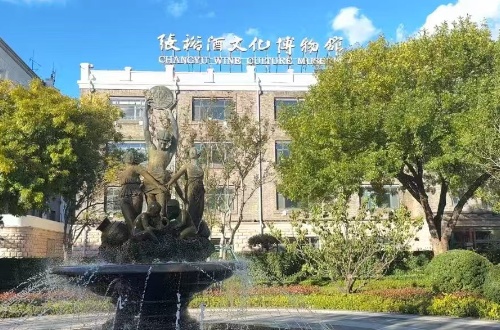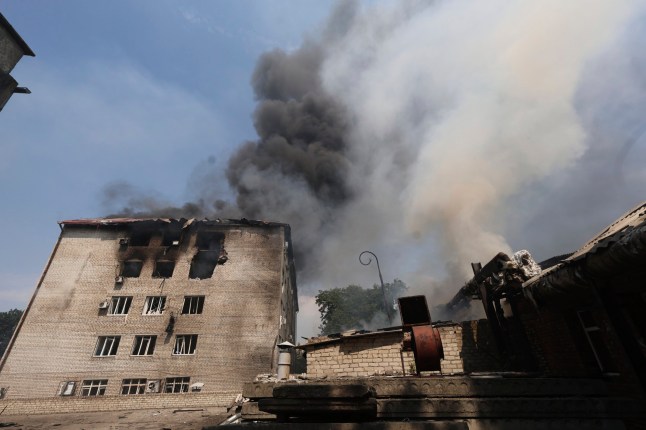07-09
The Third Silk Road Friendship Award Ceremony held in Beijing
 2024-01-03
2024-01-03
On December 27th, the third Silk Road Friendship Award Ceremony, jointly hosted by the China International Culture Exchange Center (CICEC) and the Global People Magazine of People’s Daily, and co-organized by the China International Culture & Arts Co. Ltd. (CICAC), was held in Beijing. YANG Chuantang, Vice Chairman of 13th National Committee, Chinese People’s Political Consultative Conference (CPPCC) and Chairman of the CICEC, HU Guo, Vice President of People’s Daily, LI Baodong, HE Jianzhong, and XU Lirong, Vice Chairpersons of the CICEC, and others were present at the ceremony.
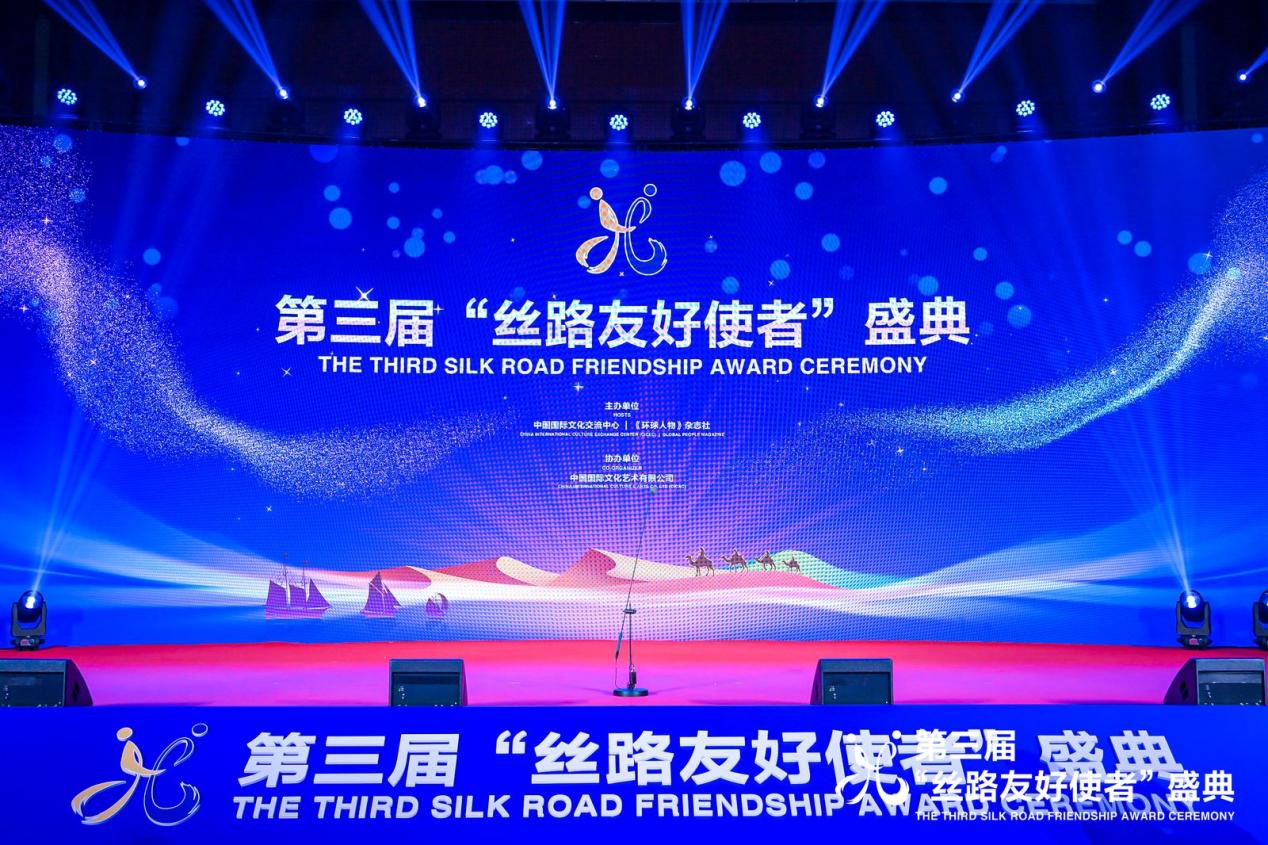
The Belt and Road Initiative is proposed by China but the achievements and opportunities belong to the whole world. Themed on “telling stories of the Belt and Road participants”, the event nominates 11 groups of individual recipients worldwide of this year’s award from a pool of more than one thousand candidates. The recipients come from more than 10 countries in Asia, Africa, Europe, North America, South America and Oceania, covering politics, economy, culture, education, medical care and other fields. Their stories fully demonstrate that BRI indeed benefits peoples along the Belt and Road and brings a real sense of gain, happiness and security to them all.
At the event, more than 300 people, including diplomatic envoys from nearly 10 countries in China and those at home and abroad who are concerned about the BRI, gathered together to listen to the Ambassadors of Silk Road Friendship telling the extraordinary cross-cultural exchanges of ordinary people in the BRI. The audience could appreciate all these Silk Road stories of people-to-people connectivity.
In the story, there is the “Grass of Happiness” across the sea.
In 2020, Freda Korarome came to China to learn the Juncao technology. Later, Juncao followed Korarome across the sea and took root in Papua New Guinea, a Pacific island nation. Now, Korarome’s mushroom farm can produce 200 kilograms of fresh mushrooms per week and she also become the local “entrepreneurial leader”, promoting the Juncao technology to the surrounding villages and encouraging people to plant the “Grass of Happiness”. Nowadays, this handy, quick returns and people-centered technology has become one of the important public goods provided by China to the international community, spreading to more than 100 countries and regions. “I am grateful for the Belt and Road Initiative from the bottom of my heart, which has changed my life and our country.” At the Award Ceremony, Freda said with emotion.
In the story, there is the love beyond national boundaries between the daughter and her “Chinese mother”.
Alifa Chin, a 13-year-old Bangladeshi girl, has a “Chinese mother”, Ruifang Sheng. In 2010, China’s navy hospital ship “Peace Ark” went on a friendship and humanitarian voyage and visited Chittagong, Bangladesh for the first time, providing medical services to locals free of charge. Among these Chinese servicemen and women wearing medical uniforms, a figure with valiant and heroic bearing is particularly eye-catching and she is Ruifang Sheng, an anesthesiologist in the crew. In order to save a woman suffered a difficult delivery due to a severe heart problem, Ruifang Sheng,
together with her colleagues and comrades, performed a caesarean section under great pressure and succeeded in saving the mother and the baby girl. Her family named the baby “Chin,” which means “China” in Bengali. Nowadays, Chin wants to be a China-Bangladesh friendship messenger when she grows up, and wishes to study at a medical school in China in the future so that she can save lives just like her “Chinese mother.”
In the story, there is the new case of green development.
8 years ago, Abderrahmane Salem became the architect of the “Great Green Wall”. At the moment, there is a solid wall of green trees stretching along the southern edge of Sahara Desert. The region used to be swallowed in clouds of sand and dust is now being transformed into a paradise for animals and plants. The inspiration for Africa’s “Great Green Wall” comes from China’s “Three-North Shelterbelt”. In 2023, Abderrahmane traveled twice to China, a “warm and friendly” country, to learn advanced experience in combating desertification. He spoke with excitement, “We are astonished by what China has achieved in this area! I want to bring the experience back to Mauritania.” China-Africa cooperation in desertification control and prevention also promote China-Africa friendship and people-to-people bonds. Chinese and African people are working together to draw a blueprint for “a community of life for man and nature” !
In the story, there is also a bridge of communication and a song of cooperation.
Dr. Ammar, who is originally from Yemen, has resided in China for 27 years. At the age of 13, acupuncture used by Chinese doctors cured his father’s illness, and also inspired him to study medicine in China. Ammar came to study in China in 1996. After obtaining his Ph.D. from Zhejiang University in 2013, Ammar became a doctor at the Zhejiang University School of Medicine’s Fourth Affiliated Hospital in Yiwu. In 2015, Ammar established the Silk Road Culture Club, helping more foreigners to learn about Chinese culture. “I have witnessed China’s development and the Belt and Road Initiative. The greatest years of my life were spent in China.” Amar said in fluent Chinese.
In 1988, UNESCO launched the project entitled “Integral Study of the Silk Roads: Roads of Dialogue”, and appointed Diène from Senegal as its coordinator. Thanks to his efforts, the UNESCO has launched five cross-country expeditions. In 1991, he departed from Venice, Italy, retraced the maritime Silk routes, and finally arrived in Quanzhou, China. Since then, Diène has visited China more than 20 times, and made outstanding contributions to the study of the Silk Road. Diène said that the BRI inherits the spirit of the ancient Silk Road, namely that prosperity and peace are built on mutual respect and mutual understanding among different civilizations. This value is a common legacy shared by all humans.
Manuel Torres Salazar moved to Shanghai from Spain 12 years ago. He settled down in China thereafter. As a council member of the Belt and Road International Lawyers Association (BRILA), he provided legal advice to resolve disputes, facilitating economic and trade exchanges between China and Latin American countries. He helped Chinese enterprises working in Latin American countries such as Chile, Venezuela and Colombia to build mines, bridges and roads. While introducing Chinese technologies and ideas, these enterprises also demonstrated Chinese wisdom and work ethic. With his help, many foreign companies gained investment and built market share in China.
In order to find a route of installing the grid without harming the natural environment, Ricardo Abranches Felix Cardoso Junior, Director of Health, Safety and Environment, State Grid Brazil Holding (SGBH), led his team deep into the jungle, investigating the habits of the local animals and plants. After completing a thorough research and study, Felix designed the 5-year strategic planning for SGBH’s ESG journey. Felix pointed out that the Belt and Road is a pathway to invest in the future. He hopes that in the next 10 years, under the BRI, Brazil-China electric energy cooperation will bring prosperity and opportunity to more and more Brazilian families.
The Belt and Road story of Fenlan Khu, an ethnic Chinese in Russia, focuses on international youth. In 2012, Fenlan Khu came to China to study, and actively participated in international student activities. Together with her classmates, she founded the SCOLAR Network in 2017. Fenlan Khu believes that the BRI’s value is not solely limited to infrastructure construction and investment, but also to unite young people around the world and promote their connections. In the last few years, the Network has established branches in multiple SCO countries, and collaborated with several Chinese and foreign universities, encouraging young people to exchange ideas and start businesses.
Mark Levine, an American specialist at Minzu University of China, has dual roles as an educator and composer of folk music. In 2005, he came to teach in Huai’an, the hometown of Premier Zhou Enlai, and fell in love with China deeply. Ballads are his means of expressing love. He wrote 80 songs about China and also received a great deal of friendship. As he sings in the song, “The People’s Republic of China is where I hope to live for an extended period. I’ve been living here for many years and I’ve always felt at ease!”
Sheradil Baktygulov, from Kyrgyzstan, devoted his research on the Belt and Road Initiative and China. The border between Kyrgyzstan and China is near where Baktgulov was born. When young, he had the opportunity to listen to Chinese radio, and occasionally witnessed Chinese convoys carrying goods. This resulted in him becoming interested in China. Baktgulov first visited China in 1998. Since then, he has visited China over 20 times, and participated in many academic conferences. At the same time, Bhakhtgulov was the organizer of many academic events focusing on Kyrgyzstan-China relations and the Belt and Road Initiative.
Irene Maria Gioconda Elisabetta Pivetti, President of the Italy-China Friendship Association, has devoted herself to establishing connections between the East and the West through economic and cultural exchanges for many years. Known for her many “firsts” in European political circles, this legendary woman has also been an economic consultant to many cities in China. She advocated and supported the China-Europe freight trains and assisted Chinese delegations visiting Italy on multiple occasions, facilitating cooperation between companies from the two countries. In her opinion, the EU’s top priority should be cooperation with China. “I am hopeful that the Belt and Road cooperation will continue to contributing more to the international community.”
The Ceremony also held the plaque presentation session of the Silk Road International Health Cooperation and the signing session of the Silk Road Youth Entrepreneurship Programme.
In recent years, the Belt and Road countries have made fruitful achievements in cooperation and exchanges in the field of medical and health care. The Silk Road International Health Cooperation Program aims to promote pragmatic medical cooperation, strengthen technical exchanges of medical talents between China and other countries, and better build a community with a shared future for mankind. The Belt and Road Initiative has created new opportunities for youth development, and youth has also injected new impetus into the Belt and Road Initiative. The Silk Road Youth Entrepreneurship Program aims to provide young people with employment and entrepreneurial resources and accelerate the establishment of a new development pattern of youth participation in the Belt and Road Initiative.
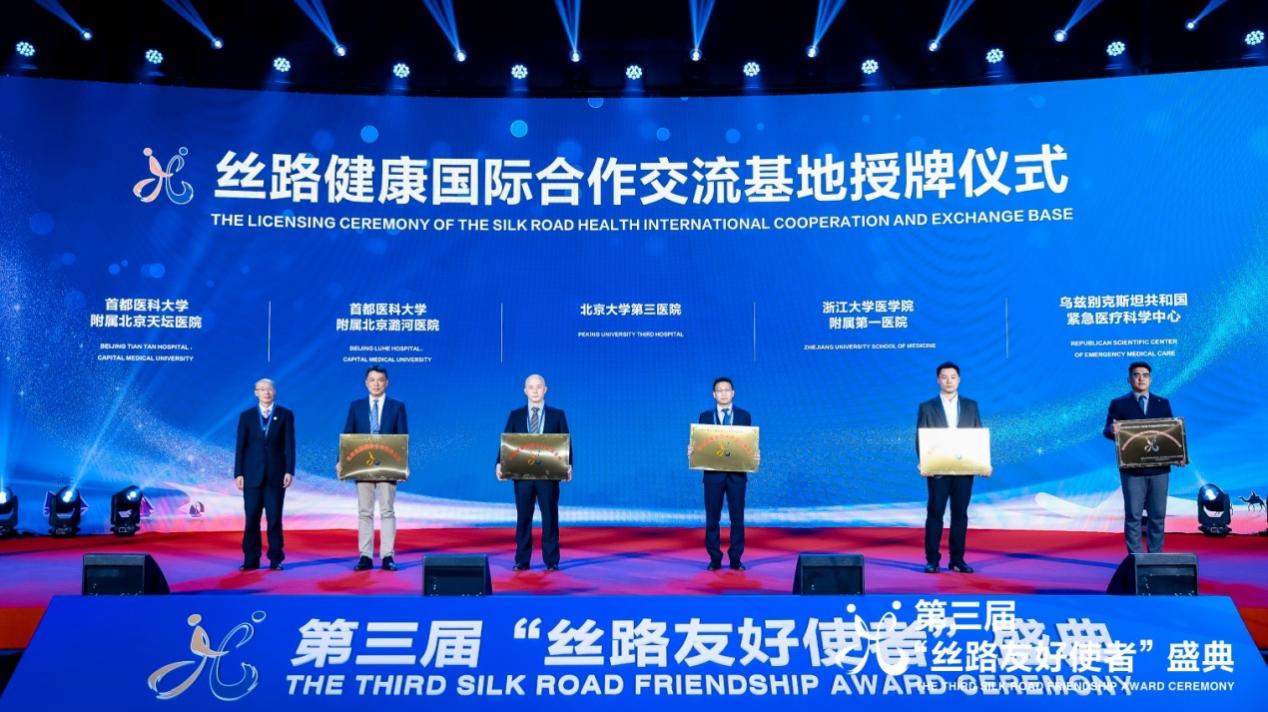
Plaque Presentation Session of the Silk Road Health International Cooperation and Exchange Base
At the end, the token of the third Silk Road Friendship Award Ceremony- the Silk Road Treasure ship Blocks Model was released. The Treasure Ship is a symbol of connectivity, peace and friendship for continuing the Silk Road relationship over a thousand of years and embracing the Silk Road dream in the new era.
The token of the third Silk Road Friendship Award Ceremony - the Silk Road Treasure Ship was officially released on the spot.
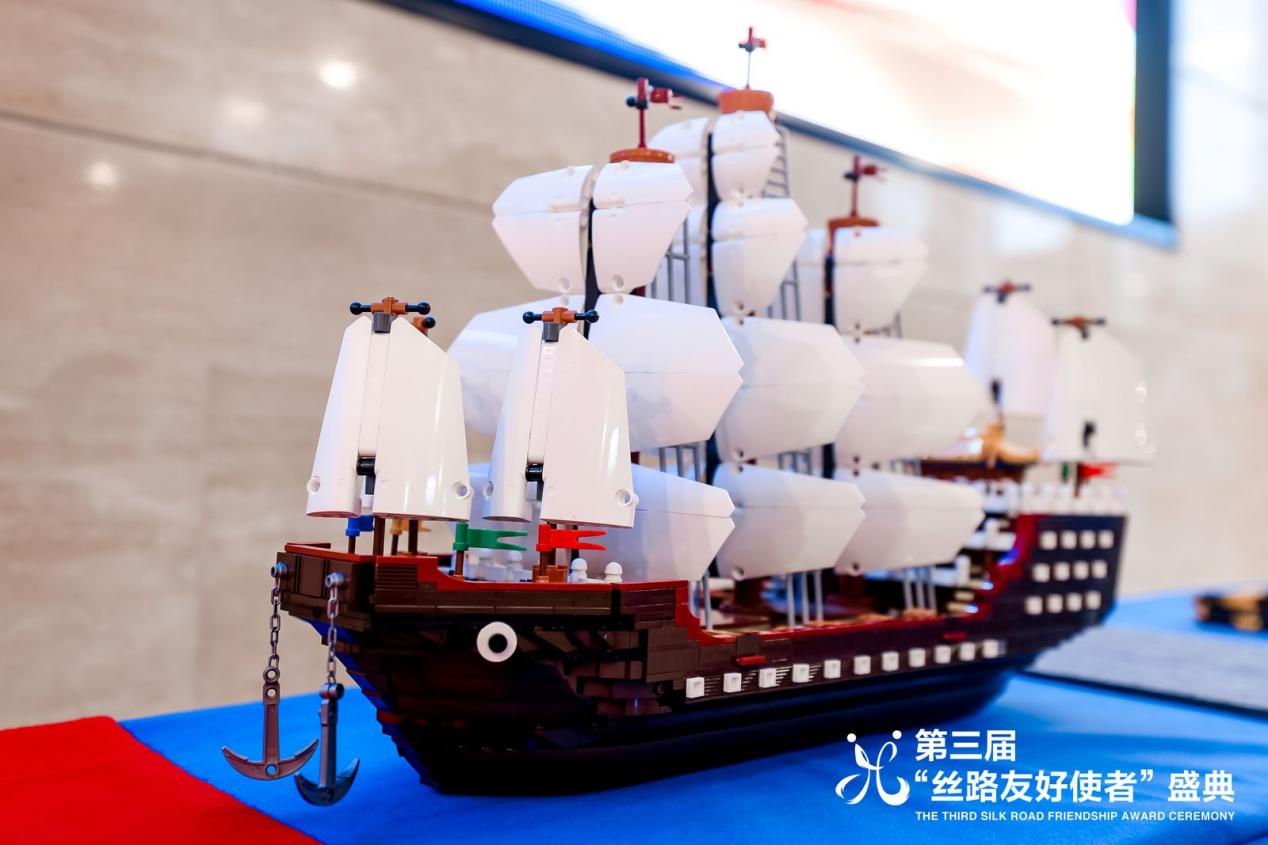
The token of the third Silk Road Friendship Award Ceremony - the Silk Road Treasure Ship was officially released on the spot.
In the evening, a number of artists performed. The Kuche City Qiuci Dance Troupe opened the ceremony with an artistic piece, Music and Dance of Qiuci to reproduce the ancient and prosperous Silk Road culture.
“The Belt and Road Initiative will once again write a new chapter, as it brings with it the vision and achievements of common development,
and everlasting friendship!” This is a testimonial from a recipient of Ambassador of Silk Road Friendship at the scene. It is also the expectation and confidence of countless ordinary people for the next golden decade of the Belt and Road Initiative due to their own experiences.

